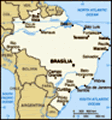Advertisement

 Serro
Serro
Far away from Ipanema...To put it mildly, Serro is rough around the edges. Arrival into this mountain community, as its namesake infers, is a rude awakening. Ninety kilometers, but a three-hour bus trip from Diamantina, its backdrop could not contrast more starkly to the sparkling movie sets of Diamantina, Ouro Prêto, or Tiradentes. A curly haired ten-year-old and I rock and yaw in unison as the bus navigates the few portions of road that are paved. Housing is abysmal and hard to distinguish from scurvy storefronts in the outskirts. Only around a sharp curve in the distance does the view improve. The center of town is now a half mile off. The hopeless and repetitive scene of block concrete buildings connected by sagging electrical wires in time appears more in line with the 20th century. Moreover, there is a greater concentration of churches and pedestrian traffic ahead. A few trimmed palm trees also are visible.
The main street through Serro provides refuge from its raspy outskirts. Its is an active and well-kept avenue of a few banks, social service centers, a school, bakeries, and corner stores. Its only guesthouse has been closed for two months, relegating visitors without connections in town to stay at

 Rustling in Tree
Rustling in Tree
Looking for attention...a communal barracks by the bus station. Examining the bedding and chipped paint on the walls through its open window, I’d rather stay in a leper colony. Vehicles struggle to successfully get from one end of the main drag to the other unimpeded. Not conducive to two-way traffic, cars must often back into sidewalks, slower pedestrians, or light poles to let the oncoming burnt orange Datsun pickups, Fiats, and Beetles get by. All the while, indifferent locals lunge and slide against bumpers and license plates to make their way home. Many also manage this while laboriously pushing wheelbarrows full of scrap metal and textiles over the uneven surface.
Serro’s roads are of stone. Unlike its richer cousins, much of it is ripped up, and in disrepair. A light brown film of dirt colors the surface of all paths in Serro, vehicular and otherwise. In fact the whole town is covered in this very fine layer of grime, which is kicked up by passing traffic and worsened even more because of the dense discharge of diesel fumes. The powder blankets everything: windshields, sidewalks, trash bins, statues, and park benches. To maintain consistency, even the churches’ window trim is painted brown.
Its

 Bus Station at Serro
Bus Station at Serro
Rural, regional, and forlorn...crude exterior notwithstanding, I actually like Serro in an odd sort of way. Those few who venture this far are compensated with a slice of authenticity. However unpolished, Serro’s historic architecture is by and large intact. Serro is the anti-Tiradentes and opens a window to the Minas Gerais most foreigners will never dare explore. And not all is terrible here. The view from the church grounds overlooking the center and all the nearby hills and homes forged into them is impressive. I spotted three other tourists in town, no more difficult than catching sight of a few tattooed skinheads at a 50 Cent concert. Each time while crossing paths, we acknowledged each other’s existence, smiled, and pretended our encounter never happened.
I had a buffet lunch of beef stew, rice, chili peppers, and beets at a local eatery on the main drag. Overall, lunch in Serro is purely an affair to provide oneself sustenance as soon as possible. Patrons have the money to afford a meal in the back hall of the lunchroom. Consequently, they, unlike too many others, have a job. So, time is limited. Eat, and get back to work. The man with whom I shared a table

 Policia Militar
Policia Militar
Faint signs of law and order...at lunch spoke very little. But we did arrive at two agreeable conclusions over our brief conversation. One, Brazilians know what to do with beef. Here it comes marinated, roasted, and doused in spices and garlic. Dissimilar to Europeans who abuse beef by frying into a dry, leathery layer of durable fabric, Brazilians take beef seriously. Give Brazilians beef and an open fire and something tasty will result. Do the same with Europeans, and at least you’ll be able to fix your roof. Second, when it comes to strangers, people from Minas Gerais are the South American equivalent to New Englanders. Could shouldered and elusive at first, once the ice is broken, you have a friend. Nevertheless, breaking the ice can require much frustration and diligence. He did not want to chat further. He grabbed his briefcase, wiped his mustachioed upper lip with a wax paper napkin, shook my hand, and out the door he sauntered.
Serro’s retail outlets reflect the town’s Je ne sais quoi attitude. They stock a non-sensical inventory of supplies, goods, and commodities. Imagine walking into Pier One Imports and finding half the shelves with brand new car batteries on sale. How about swinging by CVS Pharmacy to get that pig feed you’ve needed for your farm? That’s Serro for you. I walked into three separate general stores. Here is what I found in no particular order. All the following items are within sight of each other.
Store #1: ceramic Madonna’s, bicycle tires, three microwave ovens, and incomplete sets of cutlery.
Store #2: Bras piled up in a bin next to a second hand television set (I can’t see the connection there either), tea kettles, bulk packages of rubber bands, and new office furniture.
Store #3: Tablecloths, oscillating fans (the kind whose guard is so wide that a child could loose a digit or two), lime green flip flops, pocket calculators, and miles of copper wiring.
Waldemir Tiago Perreira used to live in Hyannis, Massachusetts, he told me. This immediately grabbed my attention not only because I am from Connecticut, but also because no one from Serro could possibly make this up. When learning that I was not Italian as was his first guess, Japanese, or Martian, he became overjoyed with meeting an American and conversing about Massachusetts, or the little he recalled from eighteen years ago. He switched tables and joined me at an outdoor restaurant, the only one in Serro of worth. He had kept his driver’ license and showed it to me. It was in perfect order, albeit expired. Atop it read, Commonwealth of Massachusetts. He then introduced me to the waiter. His nephew, about nineteen years old, had a face so perfect in shape and proportion that it would instantly be on the front cover of billboards across the United States and magazines from GQ to Ebony. The boy’s uncle, on the other hand, looked like Morgan Freeman after having been pulverized by a meat tenderizer.
I carry a map of the U.S. with me. It is a wonderful tool and a way to ease into conversations with people while abroad.
“You see? Here is where you lived.” I pointed to the print letters of Massachusetts.
“Yes!” Without hesitation, he slid his finger down to Cape Cod and located Hyannis. “That is where I used to wash dishes. But I do not remember the name of the restaurant.”
I showed him Nantucket and Martha’s Vineyard, vacation islands, as Hyannis is where the ferry docks are located. “Did you ever go here or here?” The names meant nothing to him. He turned silent.
“I…I don’t think so.” Nor would I, I thought. Not if my salary was that of a dishwasher.
“Nantucket is an old native word, Waldemir. It means ‘Where the poor people cannot afford to spend a week in summer.’
“Oh…” He didn’t get it.
Yet, Waldemir, without gazing at the map did remember Orleans, Wellfleet, and Provincetown. “Are there still gay people there?”, a direct allusion to Provincetown.
“Plenty. Plenty.” I assume the gay scene in Serro is lacking then? Better not to ask.
All of the towns dirt, grunge, trash, air particles that barely remain airborne, and decomposing compost material flow downhill with the help of a rain shower to collect as standing material at Serro’s magnificently awful bus station. A side restaurant is my shelter from a scene so filthy since trying to get out of San Salvador. Calloused men load massive packs onto the roofs of buses formerly used for, but not completely destroyed by hydrogen bomb testing. All imaginable goods are stuffed into the rear of these dented torpedoes on wheels. Hoards of passengers sit and wait, get in line to wait, or push, tug, and shove to get on board. Tension mounts as some of the people still not aboard realize that space is dwindling for points more bucolic than Serro. They line tightens and old women become sandwiched between sacks and the backs of men in front of them. Other men attempt to go around the line and squeeze on. A small melée ensues and just as quickly ceases. If the Ultimate Fighting Championship seeks raw talent, they should recruit at this bus station. It is not for the weak, kind, or polite. Buses arrive and depart miraculously on schedule, having to back out with the help of men waving them as far as the rear of the vehicle will go before ramming a parked truck, a concrete wall, or three-legged dog. It is pure, disorganized commotion. Comparatively, the traders on the floor of the New York Stock Exchange act as if they’re in a reception line at a wake while in an operating room.
Only a daytrip, the return as hard as it is to believe, took longer than to get to Serro in the morning. Overall, I spent more of the day on the bus in each direction than truly in Serro itself. The sunlight slowly faded away. By the time we reached past the halfway point at Presidente Kubitschek, all but two of the passengers who stepped on at Serro were gone into the rural night. Day laborers sit together on the roadside and drink beer in cement bunkers posing as bus stops. The bus motor hummed to the cadence of the manual shifting of gears and eyelids became heavy.
Advertisement
Tot: 0.051s; Tpl: 0.011s; cc: 11; qc: 30; dbt: 0.0245s; 1; m:domysql w:travelblog (10.17.0.13); sld: 1;
; mem: 1.1mb











